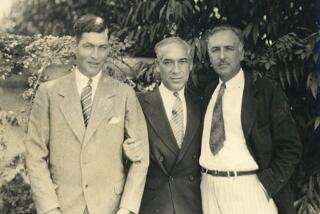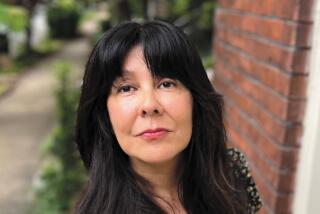Book Review : A Pioneer Anthropologist Caught in Lost Generation
- Share via
A Stranger in Her Native Land: Alice Fletcher and the American Indians by Joan Mark (University of Nebraska Press: $32.95, 428 pages; paperback: $16.95)
The recent death of Barbara Tuchman reminds us how much our lives--and, indeed, our civilization--are enriched by the courageous and gifted individual who, out of sheer passion, creates herself or himself as a scholar, or an artist, or an intellectual force. As we learn in “A Stranger in Her Native Land” by Joan Mark, the pioneering 19th-Century American anthropologist Alice Fletcher was precisely such a woman.
Only five years after Little Big Horn, at the age of 43, Fletcher left New York for the Indian reservations and encampments of the Dakota Territory, Nebraska and Idaho, where she set about the self-appointed task of “turning herself into an anthropologist.” Fletcher’s only academic credential, earned much later in life, was a fellowship at the Peabody Museum of Archaeology and Ethnology at Harvard--which is also her biographer’s “professional home”--but Mark counts Fletcher “as a member of a lost generation in American anthropology, a little-known group of remarkable pioneers . . . who shaped the study of anthropology more or less as it continues in the United States.”
Mark approaches the life of Alice Fletcher with an explicitly feminist perspective: “Over and over again, Alice Fletcher found herself struggling against male power, male authority, and male prerogatives, against the limits her society imposed on her because she was a woman,” Mark writes. “By the testimony of her actions and her repeated words, this ‘struggle’ can be seen to be a central motif in her life.” But the book is mercifully free of dogma or doctrine--and, in fact, Mark’s most convincing insights are related to Fletcher’s inner emotional life, not her feminism.
Born in 1838, Fletcher received a genteel upbringing in what constituted the polite society of 19th-Century Brooklyn, N.Y. Her adolescence and early adulthood, however, are mostly a blank--Mark discovered that Alice Fletcher destroyed virtually all evidence of her first 40 years of life. (Mark, an enterprising researcher, has uncovered an obscure but intriguing reference to her stepfather’s “fiendish malice,” which ultimately drove Fletcher out of her family home.) Fletcher occupied herself as a governess, then as a clubwoman and a kind of activist (“I have labored by my pen and my voice . . . for the elevation of women, and the purification of the race from the sins of drunkenness both of spirits and tobacco”), and finally as a lecturer on prehistoric North America.
Powerful Curiosity
By 1881, Alice Fletcher was already infected by a powerful curiosity about the Indians of America, a curiosity that would grow into a passion and a life’s work. Fletcher regarded the Indians both as a subject of scientific study and as an object of her well-intended if arrogant and sometimes misguided attention and advocacy. She poses a strange problem as an ethnographer--even as she preserved the artifacts and folkways of the Native Americans, she was working tirelessly to obliterate their way of life.
Mark tells the story of Alice Fletcher in readable but restrained prose, even though some of the scenes she depicts are quite remarkable. (“For my men I see a future,” the legendary Sioux chief, Sitting Bull, tells Fletcher around the campfire. “For my women, I see nothing. Pity them; help them, if you can.”) She undertook to serve the interests of the Indians, at least as she perceived them, and invented herself too as a sophisticated and effective Washington lobbyist--”a dreadful bulldozer,” in the words of one United States senator of the late 19th Century.
Mark is compassionate toward her subject, but she does not try to conceal the troubling attitudes and values that shaped Fletcher’s view of what was good for the Indians. She adamantly opposed tribal land grants: “Alice Fletcher was not trying to put something over on the Indians,” Mark explains. “She truly believed that they were being held back by having too much land.” And Fletcher argued, successfully, that the tribal unit ought to be broken up. “Thus did paternalism,” Mark explains, “or rather a forceful form of Victorian maternalism, come to hold sway in the United States Indian policy of the 1880s.”
The approach to Indian land policy that Fletcher endorsed, along with others in authority, was called “severalty.” Instead of preserving the spacious communal reservations granted to the Indians by treaty, Fletcher advocated a program of parceling out homesteads to individuals and families. Quite unlike contemporary ethnographers, Fletcher played an active role in implementing a policy that helped destroy the traditions of the very people she studied--Fletcher served as a government land agent who roamed the Indian territories, handing out 40-acre deeds to Indian families and bringing the weight of authority down on Indians who refused to give up their old tribal ways.
“The tragedy of Alice Fletcher’s life,” Mark concludes, “is that she was a benevolent, well-intentioned person who ended up harming the people she tried to help.”
Ironically, Fletcher came to recognize that “her radical and comprehensive program for Indian ‘civilization’ was a failure . . . and a mistake”--and, according to Mark, she perceived a “mental desolation” not only in the lives of the Indians, but in her own life too. To Mark, the loneliness that afflicted Fletcher is “a theme that takes us beyond gender constructs to a more generalized American condition.”
“We are all immigrants,” Fletcher declared. “Living with my Indian friends I found I was a stranger in my native land.”
More to Read
Sign up for our Book Club newsletter
Get the latest news, events and more from the Los Angeles Times Book Club, and help us get L.A. reading and talking.
You may occasionally receive promotional content from the Los Angeles Times.










